
Emma Lewisham: Leading a movement towards a circular economy

Businesses of all kinds have a role in reducing our impact on the planet. Small companies can be more agile, providing an opportunity to take the lead on sustainability. You can positively impact the environment and attract today’s eco-conscious consumers, becoming a preferred brand for them.
Sustainability should be built into the core of a business, with your people believing in your vision to embrace sustainability fully. On a mission to radically change the way beauty businesses operate is Emma Lewisham, a New Zealand business owner who has created the world’s first certified climate positive beauty brand under Toit? Envirocare’s Climate Positive Product Certification.
In the latest episode of Xero CEO Steve Vamos’ podcast, What Led You Here, Steve talks to Co-Founder and CEO Emma Lewisham about her journey so far.
Emma Lewisham is pioneering the way modern beauty businesses need to operate. Emma Lewisham moved away from the traditional, linear ‘take-make-waste’ model of beauty, and it now offers a circular-designed product range that is 100% refillable.
??Toit?’s calculations have shown that choosing to buy an Emma Lewisham refill pod or pouch instead of purchasing one in traditional style packaging, reduces carbon emissions by up to 74%. And while sustainability is at the heart of all of the brand’s decisions, it has become well-known globally for its coveted product range that is 100% natural and rooted in science, with independent clinical studies proving its intended results.
Moving towards a circular economy
Emma founded her eponymous beauty brand to set a new benchmark in beauty. When she was pregnant, Emma was told to cease using a product called hydroquinone as it was ‘toxic’ and questionable for people’s health, and it put her on a path to natural skincare. She was used to topically applying high tech, luxury skincare and when Emma went looking for the natural alternative with the same science, she couldn’t find it.
A compromise existed in natural skincare, so she set out to create her own range of products where scientifically-backed, natural ingredients coexisted in harmony.
While looking at the beauty industry critically and from her knowledge in sustainability, she had a eureka moment where she could see how broken the current beauty model was. The model was linear. Brands took from the earth, made something (packaging – through fossil fuels), then consumers threw it away – take, make, waste.
This model is responsible for 120 billion units of beauty packaging produced globally every single year and why this number is alarming is that despite people thinking and being told beauty packaging is recycled, almost all of this ends up in landfills, oceans or is burnt because it’s cheaper than recycling it. ‘Take-make-waste’ packaging is also the largest contributor of carbon emissions in the beauty industry.
Since the brand’s inception, it’s been determined to create a circular model of beauty, where it reuses what already exists – keeping its resources in circulation, eliminating packaging waste and significantly reducing its carbon emissions. The circular economy is about maximising the lifetime of all resources and materials required to make a product, keeping them in use for as long as possible.
“I believe that businesses can thrive by giving more than they take, and if anything, will be more successful in doing so,” says Emma.
Giving other businesses a model to operate sustainably
The brand has a set of unique business and product practises that enable it to measure and manage its environmental impact. Emma and her team have spent years working with scientists, sustainability and strategy experts to create a fully sustainable business model that is their intellectual property (IP).
However, realising the urgent need for widespread industry change, Emma Lewisham put collaboration over competition and shared its entire sustainability IP industry-wide. The brand removed the barriers of entry to encourage and support other businesses to shift towards a circular economy.
Doing our part collectively
At Xero, we’re proud of our business customers, like Emma, who are committed to genuinely embracing sustainability. And as we grow and serve more customers, we remain mindful of our impact on the environment.
We want to help our business community be more sustainable, so we’ve collated some helpful resources from across the globe in our small business sustainability hub. Here you’ll find tips and information about sustainable businesses – from reducing your energy use, to measuring your carbon footprint.
If we all take steps towards operating in environmentally friendly ways, we can maximise our collective positive impact on the planet.
The post Emma Lewisham: Leading a movement towards a circular economy appeared first on Xero Blog.
Source: Xero Blog






